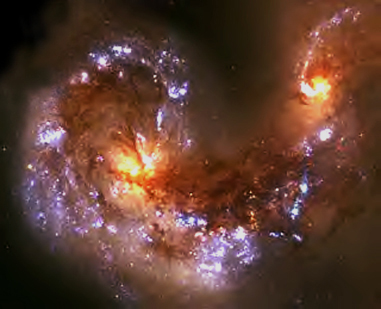
This has to be the most important question of all, and one that requires very careful consideration.To start at the beginning let's examine the question. The word 'why' is asking a question, we can all agree on that, the question being why does the universe exist. The next word 'does' when used in conjunction with 'why' is asking a question that is looking for a reason for something, in this case a reason for the universe existing. This question is based on two assumptions 1) that there is a reason, and 2) that the universe exists. Regarding the first assumption, that there is a reason, this is central to the question and it is therefore wrong to assume that it is so before we even start to answer the question
Suffice it to say that if the universe had a creator, then the creator alone would know the reason, but this should not prevent us from attempting to discover what that might be, if indeed there is a creator and a reason. I tend to take the view that if there was a creator then the creator must have had a reason, even if only out of idle curiosity to see what would happen! The creator may have a Grand Plan for the universe, but as I argued before, why? He (or She) does not need a plan, they can just make it happen
Perhaps though I am being over generous with the creator's powers. For example, It is a simple matter for computer programmers to devise a program, with all the initial rules built in, but have no idea how it will 'turn out'. To illustrate, there is a computer 'game' called "Life", Squares are marked out on a grid similar to a large chess board. Different 'beings' live in the squares. They are programed to move to other squares depending on the condition of their surrounding squares and on there own condition. Some, when landing in an occupied square marry and have children, some fight and kill, some die if they are surrounded, some change into something else, etc.It's a bit like real life. The start of the game involves placing beings in some of the squares then seeing what happens. It is actually impossible to predict the outcome of the game, it is not known until it is finished, after a set number of moves. The ebb and flow of 'civilisations', births and deaths, forms intriguing patterns across the screen, but can not be predicted. The computer, when given the initial conditions is unable to predict the outcome without actually running the program! So even though the rules are known and the initial conditions are chosen, the outcome is unknown, it only reveals itself as the game unfolds.
Could the universe be like that? Why not! Simply because the universe may have had a creator does not require that the creator knew how the universe would develop. The eventual 'outcome' of the universe would be the same, creator or not, once the laws of physics are set (the rules) and the initial conditions of the big bang chosen ('pieces' and 'values' of the pieces), then the game is started in the big bang and things take their natural course. The universe heads for its destiny, but what that may be could be completely unknown, even to its creator. In this scenario, there would not be a reason for the existence of the universe, except as a kind of experiment, it would not exist to serve a purpose, it would just exist.
If we take the view that the universe did not have a creator, then the question of there being a reason does not arise, unless you consider that the universe contains its own reason for having an existence.
What do I think?
I do not believe the universe has a reason for existing, I believe it just exists. This follows on from my previous remarks that I do not believe that we have a reason for existing. There could even be an infinite number of universes existing, some of which may have developed life, others which may not have. We should not assume that 'ours' is the only universe, we should not attach so much importance to ourselves, it is rather like the earlier belief that the universe revolved around the Earth. There is however still an 'in built' belief that we are somehow 'special', and I feel that this largely stems from a belief in God and that He put us here for a reason. Isn't it amazing the number of scientific theories where God creeps into the argument! It used to be that for everything that could not be explained it was accredited to God, or The Gods, from crop failure, disease, abnormal weather conditions, and a host of other events. As knowledge has progressed, and answers found, The need to blame, or thank God, has steadily declined as we look to science for the answers.
We do not often have to call upon God in order to explain natural events these days, but in some areas that we are still seeking answers, some people still do. I am not saying that they are wrong, but I am saying that that perhaps they are being too hasty looking to God as a 'final solution' because history has shown that given time, we often do find the answers. Perhaps one day we will have all the answers.